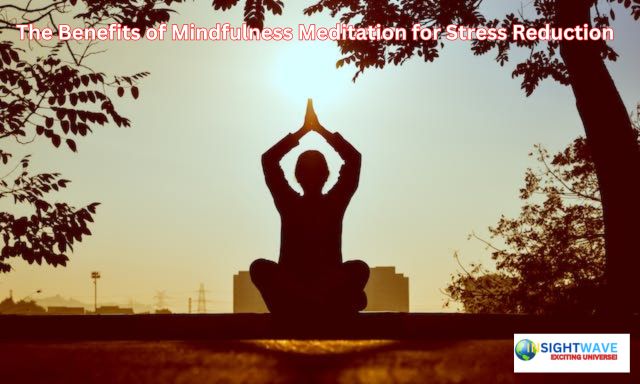In today’s fast-paced world, stress has become an almost inevitable part of our daily lives. From work pressures and financial concerns to personal relationships and health issues, stress can manifest in various forms and take a toll on our physical and mental well-being. Fortunately, there is a powerful tool that can help us combat this ever-present stress: mindfulness meditation. This ancient practice has gained popularity in recent years for its remarkable ability to reduce stress and promote overall well-being. In this article, we will explore the numerous benefits of mindfulness meditation for stress reduction.
Page Contents
Understanding Mindfulness Meditation
Mindfulness meditation is a contemplative practice rooted in ancient traditions, particularly Buddhism. It involves paying deliberate, non-judgmental attention to the present moment. While it may sound simple, mindfulness meditation is a skill that requires practice and commitment. It encourages individuals to observe their thoughts, emotions, and sensations without trying to change or judge them. This practice fosters self-awareness, enabling individuals to develop a more peaceful and harmonious relationship with their inner selves.
Stress in the Modern World
Before diving into the benefits of mindfulness meditation for stress reduction, it’s crucial to understand the prevalence and impact of stress in our modern lives. The demands of contemporary society often lead to chronic stress, which can have profound negative effects on both our physical and mental health. Chronic stress is linked to a range of health problems, including cardiovascular disease, diabetes, anxiety disorders, and depression. It can also impair cognitive function, weaken the immune system, and disrupt sleep patterns. Given these dire consequences, finding effective stress management strategies is more critical than ever.
Read Also : The Benefits of Regular Exercise on Brain Health
The Science Behind Mindfulness Meditation
Over the past few decades, extensive scientific research has explored the effects of mindfulness meditation on stress reduction and overall well-being. The results have been overwhelmingly positive, providing valuable insights into why this practice is so effective.
1. Reduces the Stress Response
One of the fundamental ways mindfulness meditation reduces stress is by calming the body’s stress response. When we encounter a stressful situation, our bodies release stress hormones like cortisol and adrenaline. These hormones trigger the “fight or flight” response, which can lead to increased heart rate, muscle tension, and a racing mind. Mindfulness meditation has been shown to lower cortisol levels, reducing the physical and emotional effects of stress.
2. Enhances Emotional Regulation
Stress often leads to heightened emotional responses, such as anger, anxiety, or sadness. Mindfulness meditation helps individuals become more aware of their emotions as they arise, allowing them to respond more skillfully rather than reacting impulsively. This heightened emotional awareness can lead to greater emotional resilience and the ability to manage stress more effectively.
3. Improves Attention and Focus
Stress can scatter our thoughts and make it difficult to concentrate. Mindfulness meditation enhances attention and concentration by training the mind to stay present. This improved focus can help individuals better manage their tasks and responsibilities, reducing the overwhelm that often accompanies stress.
4. Enhances Self-Awareness
Mindfulness meditation encourages self-reflection and self-awareness. By observing their thoughts and emotions without judgment, individuals gain insights into their patterns of thinking and reacting to stressors. This self-awareness empowers them to make more conscious choices and break free from automatic stress-inducing behaviors.

Practical Benefits of Mindfulness Meditation for Stress Reduction
Now that we’ve explored the scientific underpinnings of mindfulness meditation’s stress-reduction benefits, let’s delve into its practical advantages for individuals seeking to manage stress in their lives.
1. A Sense of Calm
One of the most immediate and noticeable benefits of mindfulness meditation is the experience of inner calm. Regular meditation practice can create a sense of tranquility and ease that carries over into daily life. This calmness acts as a buffer against the daily stresses we encounter, helping us maintain a more balanced perspective.
2. Improved Coping Strategies
Mindfulness meditation equips individuals with effective coping strategies. Rather than becoming overwhelmed by stressors, meditation practitioners learn to approach challenges with a composed and clear-minded attitude. This can lead to more adaptive problem-solving and reduced emotional reactivity.
3. Better Sleep
Sleep problems are a common side effect of stress. Mindfulness meditation can help individuals relax their minds and bodies, making it easier to fall asleep and stay asleep. Improved sleep quality contributes to overall stress reduction and better mental health.
4. Enhanced Resilience
Mindfulness meditation cultivates resilience, enabling individuals to bounce back from adversity more quickly. By building emotional and psychological strength, meditation practitioners are better equipped to navigate life’s ups and downs without succumbing to chronic stress.
5. Greater Mind-Body Connection
Stress often manifests physically, with symptoms like muscle tension and headaches. Mindfulness meditation promotes a stronger mind-body connection, allowing individuals to recognize and release physical tension. This, in turn, can alleviate stress-related physical symptoms.
6. Improved Relationships
Stress can strain relationships, as it often leads to irritability and conflict. Mindfulness meditation helps individuals become more patient, compassionate, and empathetic, fostering healthier interactions with others. Improved communication and emotional regulation can significantly reduce interpersonal stress.
Read Also : 10 Surprising Health Benefits of Drinking Green Tea
How to Get Started with Mindfulness Meditation
If you’re interested in reaping the benefits of mindfulness meditation for stress reduction, it’s essential to establish a regular practice. Here are some steps to help you get started:
1. Find a Quiet Space: Choose a quiet and comfortable place where you can sit or lie down without distractions.
2. Set a Time: Allocate a specific time each day for your meditation practice. Consistency is key to experiencing the full benefits.
3. Start with Short Sessions: Begin with short meditation sessions, such as 5-10 minutes, and gradually increase the duration as you become more comfortable.
4. Focus on Your Breath: Pay attention to your breath as it naturally flows in and out. Use your breath as an anchor to the present moment.
5. Be Patient and Non-Judgmental: Your mind may wander during meditation, and that’s completely normal. When it does, gently bring your attention back to your breath without self-criticism.
6. Consider Guided Meditations: There are many guided mindfulness meditation apps and recordings available that can help you get started and maintain your practice.
7. Seek Support: Consider joining a meditation group or finding a meditation teacher to provide guidance and support on your journey.
Conclusion
Mindfulness meditation is a powerful and scientifically-backed tool for reducing stress and improving overall well-being. Its ability to calm the body’s stress response, enhance emotional regulation, and improve attention and focus makes it an invaluable resource in today’s hectic world. By cultivating self-awareness, resilience, and a greater sense of calm, mindfulness meditation empowers individuals to navigate life’s challenges with grace and equanimity. So, if you’re seeking relief from the burdens of stress, consider giving mindfulness meditation a try. With dedication and practice, you may discover a profound sense of peace and balance that can transform your life for the better.


